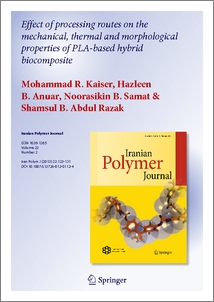Kaiser, Mohammad Rejaul and Anuar, Hazleen and Samat, Noorasikin and Abdul Razak, Shamsul Bahri
(2013)
Effect of processing routes on the mechanical, thermal and morphological properties of PLA-based hybrid biocomposite.
Iranian Polymer Journal (English Edition), 22 (2).
pp. 123-131.
ISSN 1026-1265
![[img]](http://irep.iium.edu.my/style/images/fileicons/application_pdf.png)  Preview |
|
PDF (Effect of processing routes on the mechanical, thermal and morphological properties of PLA-based hybrid biocomposite)
- Published Version
Download (1MB)
| Preview
|
Abstract
Due to environmental awareness and depletion
of petroleum oil, bioplastics and their composites are one
of the most researchable topics throughout the world.
Polymers that are produced from renewable sources are
expected to be the best alternative to replace conventional
polymers. The bottles neck of these bioplastics is its cost
which limits its application in certain purposes. Bioplastics
filled or reinforced with natural fibers can reduce cost and
improve properties, like stiffness, strength and toughness of
biocomposites. Impact strength and fracture toughness are
the main demerits of short fiber-filled biocomposite. On the
other hand, when nanoclay, having a very high aspect ratio,
is mixed with bioplastics it may significantly affect the
thermal and mechanical properties of the final composites.
A composite may also suffer dispersion inefficiency, which
is considered the key factor to improve the properties. The
aim of this paper was to hybridize nanoclay and short kenaf
fiber in polylactic acid (PLA) by double extrusion method
and followed by mechanical, thermal and morphological
characterizations. Mechanical properties showed improvement with nanoclay, specifically the impact strength
increased more than 50 % compared with unreinforced
PLA. A double extruded composite showed 3–10 % better
tensile and flexural properties than the single extruded
composite. Similarly, addition of nanoclay increased
decomposition and melting temperatures (T
m) from 198 to
225 �C and 152 to 155 �C, respectively. Crystallization
temperature (Tc
), however, dropped with nanoclay from
116 to 106 �C and storage modulus (E’) increased by about
1 GPa. These findings were also supported by scanning
electron micrograph (SEM) and transmission electron
micrograph (TEM) where in double extruded composite a
better dispersion of nanoclay was observed. By employing
X-ray diffraction (XRD) it was found that higher percentage of crystallinity was obtained while Fourier transform
infrared (FTIR) displayed new bond formation. The presence of nanoclay enhanced thermal and mechanical properties of the hybrid composite.
Actions (login required)
 |
View Item |


 Download Statistics
Download Statistics Download Statistics
Download Statistics